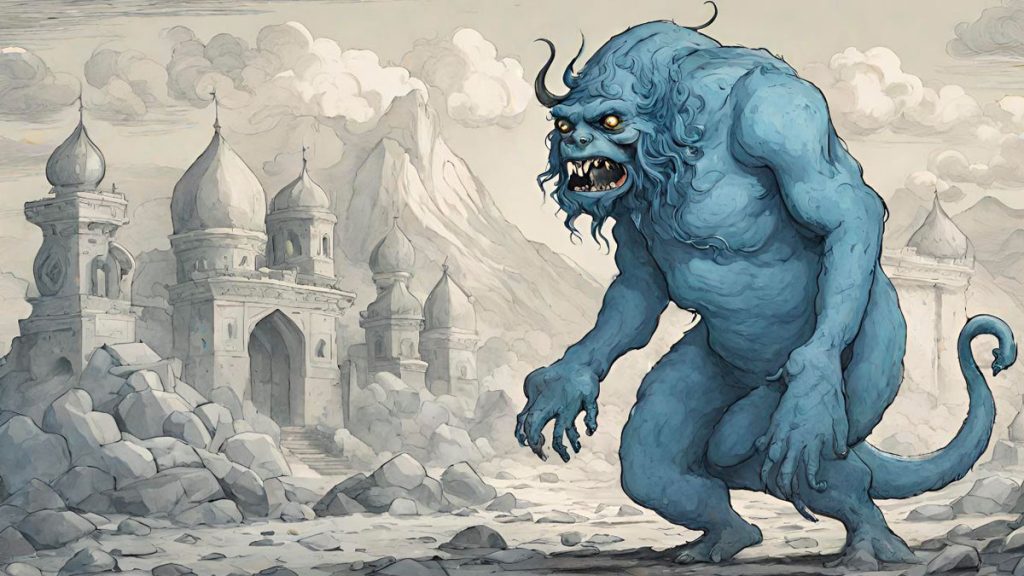Marid, often spelled as mārid and occasionally referred to as Blue Jinn, is a type of jinn prevalent within Arabic and Islamic literature and teachings. Like all jinn, the marid is a type of creature that lives in an unseen world on the earth and is classed as a species between an angel and a human.
The marid are usually considered to be the oldest type of jinn but are also the fewest in number, and encounters with humans are extremely rare. They are also thought to be the most powerful of the jinn. However, they are frequently confused with the ifrit, and within some sources, marid and ifrit are used interchangeably. Marid is sometimes used as a collective term for a rebellious or powerful jinn.
Habitat and descriptions of the marid
As well as being rare creatures, information about the marid is also scarce and often confused, and there is plenty of overlap with the other types of jinn. Physical descriptions of marid vary greatly. They are sometimes portrayed as large, hideous blue monsters, but they are also often described as old men or as animals such as porpoises or horses.

Marid can be found living across Arabia, the Middle East, Iran, and toward Pakistan, and India. They are regularly described as solitary creatures who prefer to travel alone. They can easily cross into the human world, and one Persian legend states that if you cross an older man traveling alone in the desert, he may be a marid.
However, unlike most jinn, who mainly inhabit desert areas, the marid are often found near, in, or on water. According to some sources, they can control the weather and can conjure up massive waves to punish sailors who may have angered them. They can also travel across the water as a destructive water spout.
Some sources describe them as the most evil of the jinn, whereas others class them as neutral beings who refused to pick a side between God and Iblis, the Muslim devil. Though rather than stand by innocently, these creatures will often ruthlessly pursue their own wants and desires independent of God and Iblis.
In their book The Vengeful Djinn, Rosemary Guiley and Philip Imbrogno state that some sources credit the marid with saving all jinn from extinction by subduing the followers of Iblis, the Shaitan jinn.
However, in her Encyclopedia of Fairies in World Folklore, Theresa Bane described the marid as the favored troops of Iblis because of their powerful and evil qualities. Bane also referred to the creatures as arrogant and proud, but that they could be persuaded to grant wishes through trickery or flattery.
Other sources claim the marid waged a losing war against the angels after they were asked to yield the earth and bow down to Adam, the first human.
The marid within Islamic scripture and teachings
Within Islamic literature and scripture, the marid are referred to as the “rebellious jinn.” The jinn has an entire Surah (chapter) devoted to them in the Quran; however, the marid are only explicitly mentioned once. Expert and author on the jinn, Amira El-Zein, states that the Quran sees the marid as an unruly rebellious force that disobeys God and continuously attempts to predict the future.
El-Zein quotes the following verse from the Quran 37: 7-8, which she states is the only reference to marid: “We have adorned the lower heaven with the adornment of the stars and to preserve against every [rebel satan (Shaytan marid)]; they listen not to the High Council for they are pelted from every side.”
A later Hadith refers to both shaitan and marid devils as being chained up in hell during the nights of Ramadan. The verse in question reads, “When the first night of Ramadan comes the devils and the rebellious jinn [marid] are chained, the gates of hell are locked, and not one of them is opened; the gates of paradise are opened and not one of them is locked, and a crier calls, ‘You who desire what is good, come forward, and you who desire evil refrain.’ Some are freed from hell by God, and that happens every night.”
The marid in other types of literature
However, the marid mostly appears in medieval literature, and later sources often confuse the marid with the ifrit. In One Thousand and One Nights, the collection of Arabic folklore compiled during the golden age of Islam and best known in the West as Arabian Nights, the marid often features as the jinn in the famous story of The Fisherman and the Jinni. However, some adaptations claim the jinn is an ifrit.
The marid is also featured in stories about King Solomon and the building of Solomon’s Temple. Asmodeus or Ashmedai, the king of the demons, was imprisoned in a jar by Solomon and is sometimes described as a marid jinn.
The word “marid” itself is thought to derive from the Arabic for rebellious, and it also has roots in the Hebrew words for rebel and rebellious.
References
Bane, Theresa. “Encyclopedia of Fairies in World Folklore and Mythology,” (2013), McFarland, Incorporated, Publishers, accessed April 3, 2024.
El-Zein, Amira. “Islam, Arabs, and Intelligent World of the Jinn,” (2009), Syracuse University Press, accessed April 2, 2024.
Guiley, Rosemary Ellen, and Imbrogno, Philip J. in “The Vengeful Gjinn,” (2011), Llewellyn Worldwide, Limited, accessed April 2, 2024.
Hughes, Thomas Patrick, “A Dictionary of Islam,” (1885), at Internet Archive, accessed April 2, 2024.
Lebling, Robert. “Legends of the Fire Spirits,” (2010), I.B. Tauris, accessed April 3, 2024.
Schaathun, Hans Georg. “Marid,” at Universitetet i Bergen, accessed April 2, 2024.
Sunnah.com, “Fasting,” translated from a Hadith, accessed April 2, 2024.
